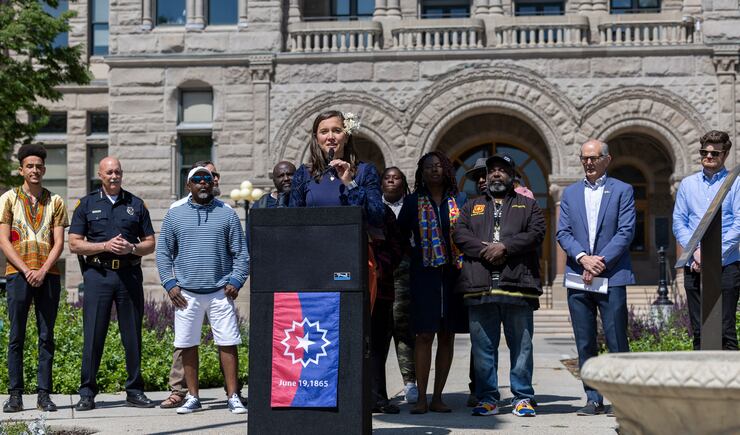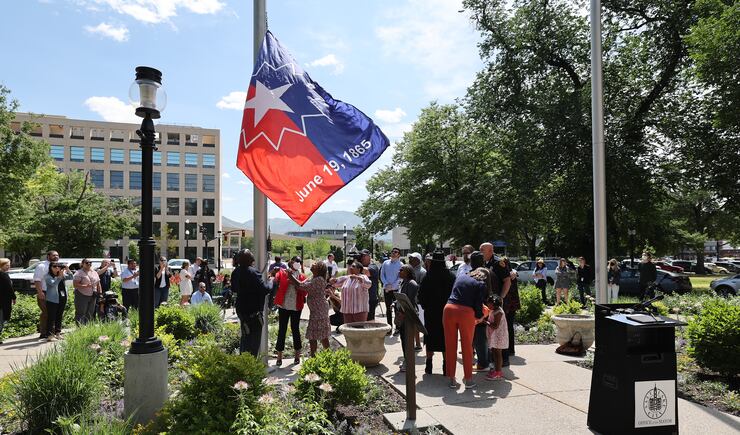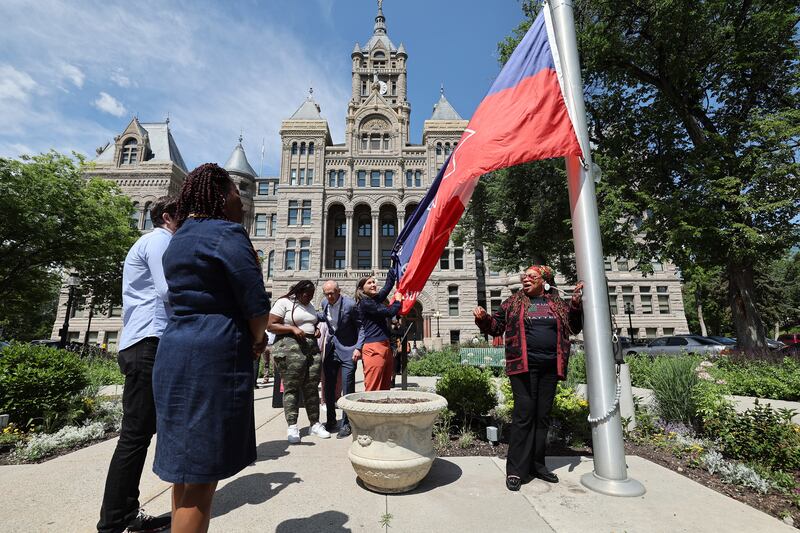Juneteeth will feel a little bit different for Betty Sawyer this year.
She still plans to attend the same family events and coordinate festivities as the director of the Utah Juneteenth Festival and Holiday Committee. But however Utah celebrates, it’ll have been between 33 and 150 years in the making. After three decades of championing the push to make Juneteenth — a celebration of when the last slaves were freed in 1865 — a state holiday, Utah will recognize it for the first time Monday.
“It feels tremendously different,” Sawyer said, moments after she and a group of Salt Lake City leaders and community organizers took turns to raise the official Juneteenth flag outside of the Salt Lake City-County Building on Tuesday.
“I think with some of (Gov. Spencer Cox’s) work here, One Utah, Nothing About Us Without Us and the racial compact, I think this is a different time,” she added. “I think more people are willing to do that work and come to that reckoning.”
The growth of Juneteenth
Juneteenth observes and commemorates the anniversary of when Maj. Gen. Gordon Granger arrived in Galveston, Texas, to deliver the last message that the entire U.S. was under Union control and that all remaining slaves must be freed. It came a little over two months after the Confederate Army surrendered in 1865 and about two-and-a-half years after the Emancipation Proclamation took effect.
The holiday was first celebrated exactly one year later on June 19, 1866. It has been celebrated by many, especially in the Black community, since then. Rep. Sandra Hollins, D-Salt Lake City, views the holiday as something akin to July 4.
“When we celebrate Independence Day, it wasn’t an Independence Day for a lot of people — for the enslaved people in particular,” she says.
Most governments in the country, including the U.S. itself, didn’t recognize Juneteenth until relatively recently, though. Texas became the first state to recognize it as a holiday in 1980, the Congressional Research Service noted in a 2021 report. A handful of other states followed suit before it officially became a federal holiday last year.
Sawyer began pushing for the same in Utah as that was all unfolding. Her journey started over three decades ago, and with the help of her good friend Hollins, Utah passed a bill that recognized Juneteenth as a day of observance in 2016.

It was a good start but not the end of a journey. The push to make it a holiday continued as the conversation about it drastically changed two years ago. Sawyer believes the video of the murder of George Floyd while in police custody was “the spark that (lit) the fire” across the state and especially in the Utah Legislature.
“That injustice, for us, was a culmination of those 400 years of injustices so that definitely had an impact,” she said.
It still took a bit longer but Hollins again proposed a bill to make Juneteenth a state holiday earlier this year. This time it passed unanimously with two dozen bipartisan cosponsors to boot.
“I am so thrilled to see us, as a state, embrace this holiday,” Hollins said. “I have been excited to see the number of people who are excited about this holiday. So, for me, it means a lot. It means my culture mattered. And it means that we get to celebrate a holiday that has been overlooked in this state.”

Now that Juneteenth is a holiday both in Utah and on a federal scale, she said that she hopes it will generate more awareness of the “pivotal moment” in U.S. history that the holiday reflects on.
Salt Lake City Council Chairman Dan Dugan said he’s willing to admit that he wasn’t aware until a few years ago because it wasn’t mentioned at all when he was in school. He hopes that the holiday is used by everyone to commemorate the liberation of the final slaves and learn why the day is important.
Both Hollins and Sawyer agree the new state holiday shows the progress made by Utahns, but they say there’s still plenty of work to go to make the state more inclusive and equitable — something that’s a work in progress.
“Yes, but we’re up to it. We’re tough. We’re pioneers — all of us,” Sawyer said. “I think once we start talking with our families, our friends (and) our neighbors and having these critical conversations, all of us can come to that same understanding of, yes, we had problems in the past but we’re going to work to rectify that, to make people whole and to repair the breach that’s been created because of those injustices.”
This year’s festivities
Juneteenth is celebrated in many different ways. Some celebrate it with a conversation around a dinner table while others may hold a backyard barbecue. The Juneteenth World Wide Celebration points out that the holiday is typically celebrated today with education, guest speakers and family gatherings either on the anniversary itself or during the week or month around it.
There are also over a dozen sponsored Juneteenth events in Utah on this year’s schedule that are either before or after the holiday on Sunday that will be observed statewide on Monday.
It began with the State of Black Utah Town Hall at Weber State University last Friday. There was then a memorial held on Saturday for Thomas Coleman and William Harvey, a pair of Black men who were lynched in Salt Lake City in the 1800s. There was also a children’s festival and a Juneteenth brunch among the events held over the weekend.
Tuesday’s event was the first of two flag-raising ceremonies scheduled — Salt Lake County will hold a similar event on Friday. Other events include celebrations at the Ogden City Amphitheater and Rio Tinto Stadium on Saturday, and more celebrations at the Ogden City Amphitheater and Millcreek Common on Sunday.
Then on Monday, there’s a health and wellness expo followed by a gospel concert at the Gallivan Center in Salt Lake City, as well as a mural unveiling at Richmond Park. The final event of the holiday is a community vigil at the International Peace Gardens on the evening of June 30.
“It’s an opportunity for us to come together and do the difficult work that is required,” Sawyer said of this month’s festivities. “So as we continue the celebration and commemoration, it would be all for naught if we don’t do the difficult work ahead to bring about a more just and fair society here in Salt Lake and in Utah and across the country.”


















